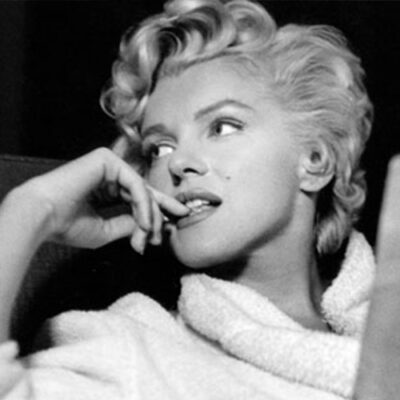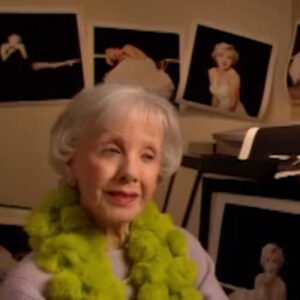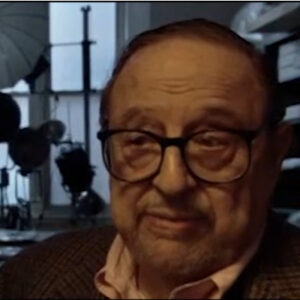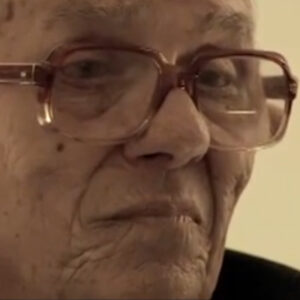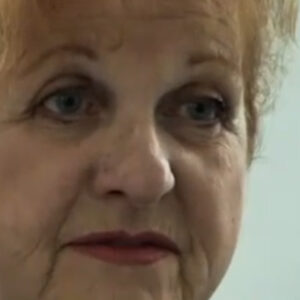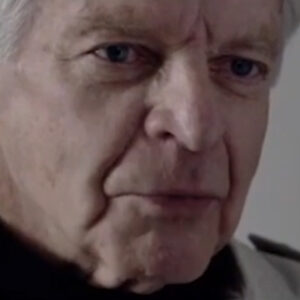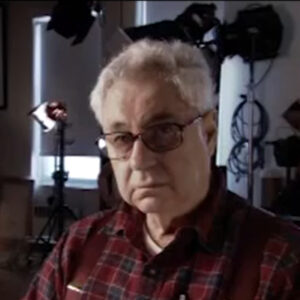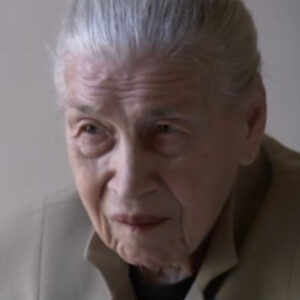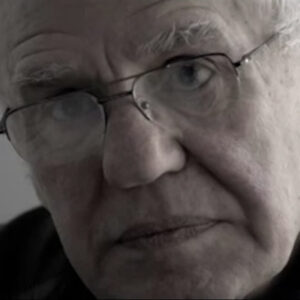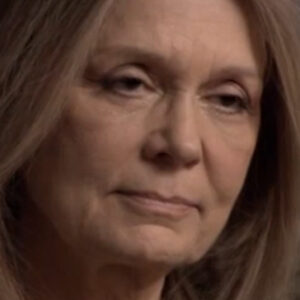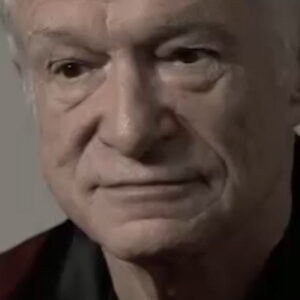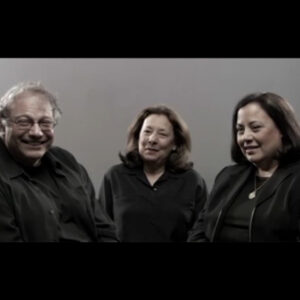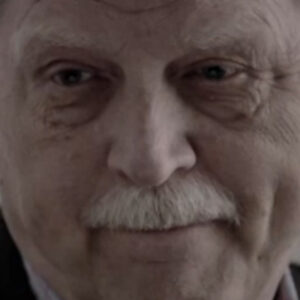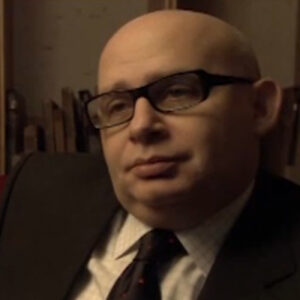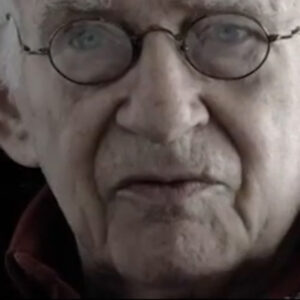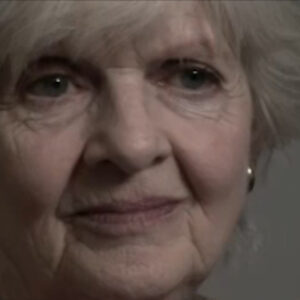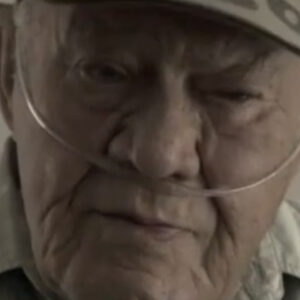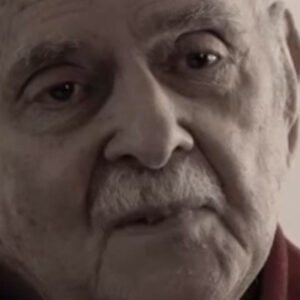Douglas Kirkland: I enjoy my life, I enjoy my work, and in the early 60s, I was very, very lucky. I was in my mid 20s. I was hired by Look magazine. Now, at that time, at the beginning of the 60s, Look magazine was very, very important for an actor. Actress had their photograph on the cover of the magazine. This was a very major Marken would help their career life for Look magazine. And Look magazine was having its 25th year anniversary. And I was asked to photograph, among others, Marilyn Monroe for that issue. And she was the largest of the stars. There were other people who were very important, Elizabeth Taylor, Judy Garland and others who was quite significant. But the super superstar was Marilyn.
Interviewer: How do you feel when you get told that this is a monolith?
Douglas Kirkland: How did I feel when I was told I was among Marilyn was one of the people I’d be photographing. I was very excited. But at the same time, I wondered if I had oversold myself if I was going to get out of my league. In other words, she was such a superstar and I was really a beginner. I was a kid from a small town. She seemed to be so sophisticated. I know subsequently that she too had her uncertainties. But as I approached her and met her for the first time, I expected this giant superstar. I lived in and on the East Coast. I came out to California here. And when I went to the apartment, I expected to see this giant star like I had remembered from the screen and with a big voice. And and she wasn’t that she was quite the contrary. She was very easy. She was like the girl next door or like a sister. I remember she slapped a coach like this and said it wasn’t him, the coach. It was the edge of her bedsits. Sit down here. She didn’t have enough chairs to other friends with me from from the magazine. And she didn’t have space for ourselves to sit down. So she said, I think of this this bed like a couch. So sit here, let’s talk. And we just had a very easy conversation. And what I wanted to do as a photographer, I was trying to make my mark was get a very sexy picture. And I was young. I one time said in a book that I did that I was I was sort of sexually supercharged at that time. I was at that time. And here here I was with the giant of all giants of of sexuality of that period. She was so easy and light, and I when I wanted to do is get a very erotic picture of her in a in a in a setting. And we started talking about it. And she’s made it happen more easily for me. I was almost embarrassed to say it being from a small town and everything as I was I was I was.
Interviewer: Like, you know, for me, but I didn’t want you to be fine now.
Douglas Kirkland: OK, I’m getting. We all go back to a story when you’re ready. OK. So here I was, a young man very excited by the idea. I was with Marilyn, this star whom who is very significant, very, very big at the time with the biggest. The year was 1961. It was I photographed her in November. November 17 was the actual date. But it was a couple of days before that. And we went to her apartment myself and the writer I was working with, Jack Hamilton and another colleague from Look magazine, and they were the older guys. And I was almost embarrassed in front of them and in front of Marilyn to say, hey, listen, I’d really like something really sexy. Really. And. I couldn’t say it really, and I just certainly my small boy away, small town boy away, sat there and she talked and we talked and she was very easy to talk with. But finally, she made it really easy for me. She said, you know, I know what we need. We need a bed, which I can be in with nothing on. I’ll have a silk sheet and I can use that to move around in. But she said it must be silk now. OK. So that was the first time I met her. I get them very disarming because she was so easy to be around and unthreatening to me. I expected to be intimidated. I wasn’t. Okay. Now I want to tell you that next time that in three days later I was to photograph right now. In that three day period in between, I lost a lot of sleep. I mean, I thought, oh, my God, here I am probably out of my league because maybe I won’t carry this off. Maybe I won’t do it. This is gonna be my morter, little my downfall. And I went I got to the studio. We’ve rented a studio. I got everything ready. And we expected Maryland to be really late. We was we were there at 7:00. And that was supposed to be the start time. I was taking pictures finally. Oh, OK. There was it was interesting. There was a young guy who was an assistant who was Chinese from China. And I’ve never saw him after that. I don’t know what happened to him. I wish I. I did know where he was. He shot 20 frames of film with my Nikon. And one of those 20 frames are so valuable because they show what went on then at a certain point. We’ll get to that later. He was asked to leave the room and so there were no pictures for a while. Then he came back in at the end and took pictures. But he did a great job. And that’s why you have pictures of me working. Well, let me tell you first about the evening. Marilyn was as predicted late, quite late, and she had asked for dumb perineal on ice, and we used to play those 33 records, 33 and a third R.P.M. records, and she wanted Frank Sinatra. So I had a record player and the records are prepared. Champagne in the bucket. And she didn’t get there. About nine thirty. And the champagne had been sitting for quite a while. By the time she came in any case, you know, the funny thing that happens to somebody like myself at a time like this. You both wanted to get started, but you start to get scared and you’re almost you’re you’re you’re anticipation is that you hope it doesn’t start because then, you know, you’re you’re it’s either make or break. And I remember waiting and I was comfortable but uncomfortable at the same time because I knew it was going to really happen. And her press agent, a man named John Springer, was there and he said, oh, she’s often late, but she she always comes through. Don’t worry. He’s trying to assure us everything was OK. You know, John?
Interviewer: I know he’s such a nice man. You. Yeah.
Douglas Kirkland: In any case. I heard a sound at the front of the studio. We were in the main studio and I went there. I assumed it was Marilyn arriving, which it was. And then I met an entirely different person. I suddenly met Marilyn Monroe the first time. It was like it was not Marilyn. She was just a fun real girl. And it seemed like Marilyn Monroe was something she had learned to put on. It was like somebody she could clothe herself with, make herself into. And she did it so well. And honestly, I want to tell you as clearly as I can with my honest reactions were when she came into the studio, I went up to the front and there was one woman where there just one woman who had some things in her arms, and she was eventually going to do her final touch up, some makeup and that sort of thing, and help her get on whatever she had to get on and or get off. And I don’t remember that woman’s name. But anyway, she was there as an assistant and the two of them came in and. I didn’t pay much attention to the assistant, it was where she was there, but what I did see was Marilyn really for the first time as Marilyn Monroe. I describe as best I can my recollection of that instant. You know, motion pictures often go in slow motion, we say, or over crank. They say in the business. And that’s what Marilyn seemed to be. She seemed to be floating in an almost surreal way. And she wasn’t almost human now. I’m sure that a lot of this was what was happening in my head, but time seemed to take on a different essence than than reality. And I watched her come in. She seemed to have a brightness. She was wearing something very light. And there was a luminescence that was almost not of this earth. I cannot. All my imagination. I’m certain. But that was how I felt. And my impressions. This was not just your average movie star. This was not even your average human being. And but that’s how I felt. Maybe it was because I’ve been waiting and everything. But she did bring that into the room. And she she came in and she crossed over and went into the dressing room without saying very much other than hello. And some small formalities like that. And she disappeared. And I went back in a studio to prepare things. And I suggested she put on a dress that she had. And we started with that and some a big piece of cheesecloth I’d gotten. And I had Jack Hamilton and the Chinese guy hold that she’s cloth. And she leaned back in and I thought I’d make an interesting picture, but we did it for about a second or two. And she said, I don’t like this. This is this is not me. This is cheap. Is not a cheap girl. This is cheesecloth. I’m not a cheese cloth kind of girl. No. Honestly, I thought. Douglas, you’re in trouble. You’ve really messed up here. So I thought, is this gonna be the end of the shoot? Because I remember here I am. I the probably the youngest photographer to have ever done a big photo session with Marilyn. I’m young. She could have had any professional in the world do it. And I was afraid she was going to say, get him out of here. I want somebody who is pro. So I she went into the dressing room again and then she came out with her assistant and then she sat and talked with Jack Hamilton, my friend, for a while. And they talked about early days, the movies and things that they’d done. And Jack had worked with her before and seemed to soften things down. And then she went into the dressing room again with her assistant, came out wearing a white robe. And I said, we will start on the bed. And she they came they came out together and she the robe dropped off. She picked up the sheet and put it in front of her. I cannot tell you what this meant to this. This young kid from this town, tiny town called Fort Airy in Ontario, Canada, town of 7000 people. That’s me. That’s who I really am even to this day. And so here I am with the sex goddess of the world, dropping everything off in front of me. And I mean, again, as a young man, it was unbelievable.
Interviewer: Quiet sure it was unbelievable.
Douglas Kirkland: So here I am with all this charge going on. And and but I was disciplined as a photographer. I mean, I have to get the work done because that’s that’s really why I’m there is not for anything for me personally. So I started working, started working first on one to one with her and and she was very good. She wanted to work. She knew how to work. She was a as an expert. She was superb at working is still camera. In fact, some people hypothesize she’d like there’s still camera almost better than the motion picture camera. Why? Because she could connect directly with the photographer. There wasn’t a script sound. All this you remember, it was just flowed into wonderful images in. And that appealed very much to her because those were her beginnings. She’d she started as a model here in Southern California and had no money really came up from the bottom. I mean, so she was a girl who had really worked her way in her life, had not been easy. And I mean, as I think of her subsequently in later years, I think of how hard she worked in and she deserved everything she had. But it wasn’t all was all right for her either. In any case, she’d been married numerous times and things like that. Her life hadn’t been easy. But with me that time that evening, it was amazing. So here I am within arm’s reach. I have Marilyn Monroe with nothing but a white silk sheet which periodically falls off and I see a little of her right side of her breast or something. I can’t tell you what that meant to me. Really. OK. So here I am. And get the camera going on. I’m shooting. She’s playing at a certain point. She’s pushes herself up in a bed, holds a sheet in front of her breasts and say, I want to be alone with this boy. I find it usually works better that way. And so she wanted the assistant out of there and everybody, her assistant, my assistant, and Jack Campbell, the writer. So they said, OK, I did almost die. And so the next thing I knew, I heard the door close behind me behind them, and I hear I was left alone with Marilyn Monroe. Now, let me go into my feelings of that moment. I thought, OK. Douglas, Doug, your ear. You’ve got to put up or shut up at this point because it’s going to happen or it isn’t. And again, really caring about photography as much as I do. And you guys may think it sounds strange that I am Marilyn Monroe and all that. And I’m still thinking about photography. But that’s why I’m there. I’m there as a photographer. That’s my first job. So I started taking pictures and then I went up on a balcony and started shooting the pictures that you have seen down. And I had done some in the beginning and the photographer photographed me photographing down. But by now, he was out of the room. It was just the two of us. And she starts turning and squirming in the bed. And that was Marilyn Monroe at her best. I have to tell you, honestly, I was the recorder of it and I played my side of it. But I give her credit for those pictures. This was Marilyn who made those pictures. I had all the technical things right near me. And remember, I had no assistance. So I was using a Hawza bed. And you had 12 frames in a roll. So I shoot twelve frames. I have to put another film back on. And that was. While it interrupted, but she still kept going and we can still keep talking. Now, I was getting more and more excited and at a certain point she looked upset. Why did you come down here with me? And you probably wonder what happened then.
Interviewer: No.
Douglas Kirkland: You’ll have to decide yourself. I can’t tell you any case. I got the pictures and I won’t claim that there was anything between us. Other than that. But there was a moment of truth for me as a photographer. Was I going to shoot or was I going to go down there in the bed with her? And I got the pictures and somebody said, if you had taken the opportunity to be there, whether it would be great, but probably you’d lost a piece of the history, because really what happened with Marilyn is. And myself, we were playing with each other to a high point of charge. And but ultimately, it was the pictures. I don’t know whether she did it intentionally. I’d say that I probably built that up intentionally. But suddenly I had a lion by the tail and I chose to guide myself, as I just mentioned. Now, the night finished, she before it face, she said it said everybody could come back in here. Some more pictures of us. May there was a picture of me lying in the bed beside her. She was on the bed. I was on the floor. The shoot had finished. And before anybody came into the room, we sat and talk, talked. Marilyn was still lying in the bed. I was lying on the floor beside her sipping champagne. Some of the Dom Perignon that we’d use during the session. And we talked about many things. We talked about our lives, early lives. I talked about my life up in Canada as a kid. And she talked about her some of her thoughts growing up here in Southern California. And I think I’d had been much luckier than she had in terms of my my world. I had a very solid family life. Hers was all over the place. But, you know, there was a satisfaction. I found that there was a real person back there. It wasn’t just the sex information, which was very significant. But after we got out of that, there was like another person stepped forward and was speaking to me. And we had shared a great intimacy. And there was finally a knock on the door. You all right in there? You said, Oh, yeah, yeah, we’d forgotten almost. They were outside. Come on in. And so the John Springer, Jack Hamilton and my assistant came back and my assistant took a couple of pictures of us as I was still lying beside Marilyn. And and it was it was another a different type of intimacy. And before long since we were finished, they packed up, they left and the evening finished. Now, I was left with a very peculiar feeling. Honestly, I’m very honest with you right now, a feeling of did I do the right thing? Should I have accepted the situation? I feel I did the right thing to do what I did because I got pictures this way. If I hadn’t, I might have had some momentary satisfaction, but I wouldn’t have the images that I have today. And Marilyn really was quite a genius. I don’t know whether she made all of this happen for the camera or for real. I believe it was for real. I truly do. And I don’t think that’s my ego speaking. Anyway, that’s that was the evening closed. And I was very disturbed after it in some ways. I had a wife and kids at home. Those were some of the reasons that I didn’t proceed with the possibility, let’s say. But then what’s what is comes next is really the next day it was to go around. It was a Saturday. I was to go round that afternoon with the picture so she could look at them. She wanted us to see them. So I went back to her apartment in Beverly Hills, small, tiny apartment. Lee like a now much bigger than a large motel room. And it’s hard to believe a superstar was living like that. But she was. And in fact, she was sort of hiding out there. She was afraid of people. It’s strange. Sad. So I went back there and. When I arrived, I buzzed the doorbell many times and she didn’t. No one came and finally she came. She had dark glasses on and scarf over her head and it was like a different person again. I mean, as I was saying, still a third person, the first being the young, easy, real girl next door. Second, the superstar, the Marilyn that we all know is Marilyn Monroe. And then now a sad person whom I felt very affected by, as I’ve been by the other two as well. But now I didn’t know what was wrong. I still don’t to this day know what was wrong. But she had a lot of troubling things happen in her life. You know, it may have been a phone call or something. Something had changed. She wasn’t right and she was depressed. And I went in and I said I had the pictures and I had a light box. And she said, Do you have a magnifying glass? And I said, I didn’t. She said, well, go and get one. I said, well, it’s time. And it was seven o’clock in the evening on a Saturday night, as if I don’t know where I can get a magnifying glass at this time. She said, go to thrifty drugs. Was a place she knew she knew her way around the streets of L.A.. And so I went to 50. Drugs doesn’t exist anymore. But it did at that time. Once it’s drifty drugs and I got the the magnifying glass in. And she had also told me to get what she called a grease pencil or oil pencil. She called it a marker China marker. And I got those things and brought them back. And she looked through the pictures very quickly wearing her dark glasses still. And she was not happy with them at first. And she got up and left the room for a few minutes and came back in just crestfallen. I was I thought, oh, boy, you’re in trouble, because she also asked me to bring some scissors back, which suggested she was gonna cut them up. And she did cut some up, fortunately, not very many. And she then took her glasses off after being out of the room for a while. And she looked at them some more. And she started to find a few she liked and which was good. I mean, that was that was such a relief. I could breathe again. She selected a final picture that she really liked. Is this picture of her lying, hugging the pillow? This horizontal image, which is became the famous one. And she spoke of herself in the third person. She said, this girl is a girl that any man would like to be in that bed with. She said, in fact, a truck driver would like to be in there with him. Now, what did that mean? A truck driver? That meant the real man, not the pretty boy, not the big time actor or wealthy man, but the kind of guy she’d grown up around that would genuinely like to be there with her. Probably she could trust him maybe more than some other people that she’d lived her life with. Remember, she’d gone through two or three marriages and had a lot of ups and downs, I’d say. And but the real man, the truck driver was was to be admired. So that was our that was at the end of the beginning. In the end. The pictures were published. She was very happy. And I one last thing to tell you about. It was about. When I learned of her death following August, that was in November 1961. And so in November, early August 1962, I was working in pairs with Coco Chanel. And one afternoon at the end of the day, I was walking back to my hotel, Loti Hotel in Paris, and it was very dark. The horns were honking and everything as they used to do a lot in Paris. They still do it quite a bit at rush hour six thirty seven the evening. And it was getting very dark. They started threatening to rain. In fact, it just started a few drops of rain. And I saw a newspaper which said in English. Marilyn is dead. Marilyn name Art, you know. That was quite a shock. And I didn’t speak very much French at the time. And I I saw this that. Does that mean what I think it means? It can’t. My Marilyn can’t be dead. Maybe it’s another Marilyn. And does that really mean dead? Which of course it did. And I went a little further and I saw another headline. And when huge headline saying is go back to my hotel. And I asked the the hall porter, the concierge about this. He said, yes, she is. She is. She did. She’s died. Yes. Yes. Mr. Curtilage. Marilyn Monroe is dead. He didn’t know what attachment I had to her, but that was that was the end. And I remembered certain things she said started to come through my mind. She spoke of what movies meant to her. She said, when I was a young girl working in a factory and she was still a young girl. But when she was very young, working at a factory, she said, If I go to the movies on Saturday night, I usually sat in the back row alone and it was a really good film. That film would carry me through the entire week. And I think that’s what movies she really should be. And that’s really what she wanted her movies to mean to all of us, to that type of fantasy. They’ll carry us through our lives. So that was the Marilyn Monroe that Douglas Kirkland you.
Interviewer: Well, I ask you a few things. First of all, she was not a stranger to and she was not afraid to take a closer. And we know that from the very beginning. And a lot of the, I think, schisms in her personality, which you’ve outlined so brilliantly for me here, the one place that at least I think he had great comfort was just what you said. I think she had great comfort in that one on one camera with one on one relationship with the lands, with the man behind the lens. And I think men in particular were better. But also I think that this. Comfort in her body was real. And I think if nothing else was, we all the other things that I think probably messed her up that.
Douglas Kirkland: Many people say that she was comfortable with her body. And yes, she was in some ways. But I have to tell you something else. It’s interesting. I was advised before the session that she was. She was happy to be. Take your clothes off if if it was appropriate for whatever she was doing. And she did it on various occasions. We know. But, for example, the first cover of Playboy magazine was Marilyn without her clothes. In any case, that book came very famous, made her famous. But John Springer said to me, you’ll find Marilyn is is lost a lot of weight and she feels good about having lost weight. But the problem is when she loses weight, her breasts get smaller and that bothers her. So no matter where she would be on the scale, it would be not totally happy with herself, her body and being in front of the camera and exposing it didn’t bother her. But she always felt she was either too heavy. And if she lost weight and wasn’t a heavy issue, was wasn’t happy. When I was with her, she was now concerned that her breasts were too small. A no win situation. Sad, quite tortured individual inside, I feel.
Interviewer: Well, also, you got her. I’d do anything I want to see. You have a sitting with Marilyn Monroe and you couldn’t have said it more brilliantly. She is Marilyn Monroe. Yes, there are many photographers. I know. I’d even like to talk to you a little bit about those shots hair because they sort of describe what you saw third, which is this cut cloaked in covered hair. And I had to tell him when we first started to talk. Golly, there she is listening so intently to Carl Sandburg. And he’s and now there she was pouring her soul at the cross. And that this is a very sad show. So.
Douglas Kirkland: Mirror of the pictures of Marilyn Monroe made by my friend Arnold Newman. And he’s an incredible photographer. But he saw a different Marilyn than I did. His was he knew Carl Sandburg. And she was fascinating, too, for I mean, he was fascinating to Marilyn. And so they met actually at a dinner party. And that’s really where it happened. And it was a fairly more of a social event. It wasn’t a photo session set up initially. And so that’s the the Marilyn that was there in all aspects of this incredible creature. Fascinating to us. Some very high, some very sad, but certainly worth looking at. And Marilyn Monroe had a richness that is fascinating to observe and and look into. And you do it very well.
Interviewer: Well, you did it very well. But the thing with the thing I’m saying about about you photographs and getting back again to this, her willingness to just just roll it over. There are other people, pictures of her in bed with me in that even I know even has pictures of her in bed, the Bert Stern pictures. By the end, there’s a whole nother. These are when you say you feel that that was a very real and a very intimate exchange. They it looks like it was whether she meant whether she knowing everything she knew and knowing her power and understanding that you were a young guy and was it is an incredible.
Douglas Kirkland: I was one of the youngest. I probably seemed not threatening to her. And she probably had a certain honestly, as someone of a sympathy for this kid, this new kid. And fortunately, I. I think we just hit on the right plane, on the right level. And she really gave to the camera as well as a gave herself emotionally to me. I mean, I suppose if I really wanted to be in that bed with her, I could have been. That wasn’t ultimately the most important thing to me. Which seems strange in some ways. Most people many people won’t believe that I didn’t take that opportunity. But I’m glad I didn’t because it’s something much bigger and more important to me up, Marilyn, than just some lovemaking. Lovemaking is wonderful, obviously. But I saw Marilyn multiples so fascinated. Marilyn, that was fascinating.
Interviewer: It is fascinating. And the sexuality of these photographs, I mean, this is a true and you see it and it’s great. This is what you were aiming for.
Douglas Kirkland: You know, what’s interesting about the pictures is what you’re seeing when you look at these pictures as you’re seeing Marilyn Monroe on the edge of lovemaking. You don’t see a. More than that, because that edge is where it is at its height. And I guess maybe that’s what I was able to record. I wasn’t clever about it. I mean, Melin was right and the timing was right. The evening was right. And that’s why I did the book called An Evening with Marilyn. And you can see. But again, it’s not my brilliance. It was just that all the elements were in place. And, you know, it was the perfect, perfect storm that evening. And I just consider myself very lucky historically that I was there and I got the most of it. Here we are many, many years later and we’re still talking about it. And I expect we’re going to be talking about Marilyn well into this century, late into the 21st century.
Interviewer: I think you’re right. What do you say? Oh, being on that edge, being here. I also think that’s absolutely right. Have you stepped over that line and even you have got, let’s say, whatever you want to happen and maybe even you have shot something after something that wouldn’t have been it.
Douglas Kirkland: Could have been the same.
Interviewer: With me at all. I think that that tension, that tautness, that that exact electricity.
Douglas Kirkland: What you’re seeing in these pictures is sexual electricity, sexual tension from Maryland. I certainly was feeling it unbelievably. But Marilyn was also so. Marilyn is the person in front of the camera. That’s the person that matters. I mean, I can I can barely tell you what my feeling was at that time. I mean, I was I was ready to explode. I think she had some of that same sense of near explosion. And that’s what you see in the pictures.
Interviewer: And all the sex. Gotta see stuff. I’m just thinking I guess I’m trying to get to you. This is really sexy.
Douglas Kirkland: I think what you’re seeing here is I don’t mean to be a modest, but I think by my luck and good chance, this is the real stuff you’re seeing in these pictures more than probably any. And there are a lot of very good photographers photograph Marilyn. And she was brilliant in front of the still camera. She was always at her best with a still camera, I felt. But I was extremely lucky. It was the timing. She hadn’t been photographed in about a year at that time. She was ready for the session. She really wanted it. And that’s what you’re seeing.
Interviewer: Also, an interesting moment with your two or you were able to sort of catalog these sort of three very distinct moods. She’s not quite over the edge yet, but she had this was right after Mr. Years, six months after misfits. Miller is gone. She’s miserable, but she’s not as miserable as she is. By the time since, she still has some healthiness. That’s right here. It’s not as if.
Douglas Kirkland: She’d been seeing Joe DiMaggio again, her ex-husband, because she needed someone to lean on and be with, although it had always been a very less than favorable relationship. I mean, a stormy relationship. But that’s where you see you see her. She was right for this session, was it was it was supposed to happen.
Interviewer: And I guess the other thing I just want to add again is the fact that. Also, over the many, even many people who intimately took pictures of her, not even in the Arnold way, but I’m just I mean, many people I think you actually did also have much more. You were really alone with her and it was really the two of you. And it wasn’t just users snapping away. It was a it was a true communication.
Douglas Kirkland: There was a you know, there was a sexuality running between us without. The final enactment, if you want, but there were six that you could grab on to so strong. I mean, I felt it from her. We were saying many NATO innuendoes. I mean, I don’t know. There was there was there was clearly there. We weren’t making any secret of either one of us about how we what our feelings were. I mean, what are what our bodies were feeling. And yet the camera had to get to film. The images had to be captured. And on the 11th hour, that was what was most important to me to get the images. Photographers are, I guess, crazy, I’d say. But I was crazy and I’m glad I was because I wanted the pictures more than any further involvement. I did, however, hope to photograph for in the future. And that was why it was so upsetting and disturbing when I learned that she was no longer going to be possible.
Interviewer: I wouldn’t ask you that. Did you ever expect to see you again?
Douglas Kirkland: All undeniably. We had talked about it at the end of the session. We almost made a date for the future and I didn’t know how it was going to happen because, look, it set me there. I didn’t know how it was going to happen because, look, it set me there and I wasn’t in a position to jump on a plane and fly it cross any place. I was a staff photographer. Look magazine at that time. And so I wish I didn’t have the freedom to jump as I could today if I wanted to, because I have a position, I work for myself and I’m financially in a position of I want to do something that I can do it. At that time, I couldn’t. I was just beginning I didn’t have much money, no staff job. And if they told me to go here, there, I would do it was an exciting time for me, a period of growth. And Marilyn Monroe was a very central figure, a very major figure for me. And I mentioned Coco Chanel and she was one of the other people was Marilyn Monroe and Coco Chanel. The two of them were very substantial, intimate part of my growing up.
Interviewer: And on the one hand, my God. And yet not dissimilar. I mean, good God or Chanel is another one. It was a master. Masterful.
Douglas Kirkland: She was indeed. And she was 79 when I was with her and I was in my mid 20s. And the funny thing about Coco, I always wondered if she thought of me as a as a suitor or like a boyfriend or a son. She treated me so well and looked after me so well. But that’s a whole other story. Marilyn Monroe’s we want to talk about.
Interviewer: One more quick thing about me, I guess, which is just maybe I want more statement from you is and I keep I’m not saying many people have sort of talked about that this many sides of her and seeing it. You only see Marilyn Monroe in your photographs is no Norma Jean lurking around. You may have met Norma Jean or you may have seen something else over there but lives in these photographs. This is Marilyn Monroe.
Douglas Kirkland: What you see in these pictures is, to me, the true Marilyn Monroe. The the. The screen. Marilyn Monroe. Marilyn Monroe. That excited people. And that night that evening, she provided me more with that than she probably had almost any people for a long time. Because, again, I was I was just beginning I was a kid. I mean, for her, she was she was 10 years old, more than 10 years old, but 10 years older than I was. But she was had far more sophistication. She died in her mid thirties. I was in my mid 20s. And again, she had she knew the world and I did not. And that’s where you see, she she allowed and she opened herself probably more to me. And that evening on that evening, and she had almost to anybody because I was, as I say, not threatening at all. And that’s the Marilyn Monroe that I saw with growing older myself. I looked back at that time and realize the unusual and extraordinary experience it had been being with Marilyn Monroe in these three different occasions and how I met many different people. And it was very powerful and very special. I I consider myself a very lucky guy. That’s it.

